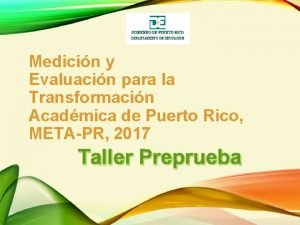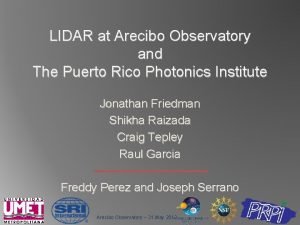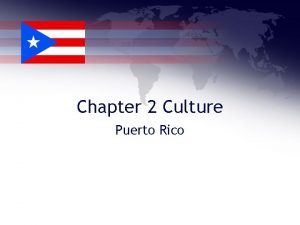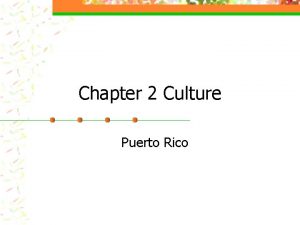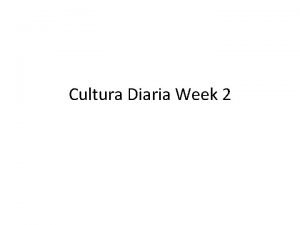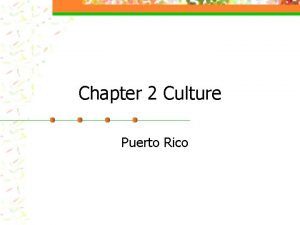Atrocities in Puerto Rico US in Puerto Rico







- Slides: 7

Atrocities in Puerto Rico US in Puerto Rico

Dr. Cornelius Rhoads

Dr. Cornelius Rhoads was an American doctor and pathologist that became infamous for performing several objectionable experiments with human beings. In 1931, sponsored by the Rockefeller Institute, Rhoads deliberately infected several Puerto Rican citizens with cancer cells. Supposedly, thirteen of the patients died. Dr. Rhoads once said in a written document: “The Porto Ricans [sic] are the dirtiest, laziest, most degenerate and thievish race of men ever to inhabit this sphere… I have done my best to further the process of extermination by killing off eight and transplanting cancer into several more… All physicians take delight in the abuse and torture of the unfortunate subjects. ” An investigation done in 2003 by bioethicist Dr. Jay Katz found that the accusations were well founded and documented.

Radiation Experiments Dr. Pedro Albizu Campos was a prominent leader in the independence movement of Puerto Rico. Albizu was imprisoned numerous times for seditious conspiracy against the United States. While in prison, Albizu said he was a subject of human experimentation without consent or warning. The U. S. Government’s response was that Albizu was insane. The president of the Cuban Cancer Association, Dr. Orlando Damuy, traveled to Puerto Rico to examine Albizu. Dr. Damuy reported burns on Albizu’s body caused by intense radiation. It is said that they placed a metal clip and film on Albizu’s skin and the clip radiated into the film. In 1994, under the administration of ex-president Bill Clinton, the United States Department of Energy disclosed that human radiation experiments had been conducted without consent on prisoners in Puerto Rico during the 1950 s and 1970 s.

Cancer rate in Vieques In 1948 they commenced bombing exercise which continued for 55 years. Over the course of their stay, more than 22 million pounds of military and industrial waste was deposited on the island. The island was bombarded an average 180 days per year and in 1998 the Navy dropped 23, 000 bombs on the island. Professor Jose Seguinot Barbosa, Director of the Geography Department in the University of Puerto Rico at Rio Piedras, states in his study “Vieques, the Ecology of an island under siege” that the eastern tip of the island constitutes an area with more craters per kilometer than the moon. As a result of all this, the cancer rate in Vieques is 27% higher than in the mainland. Most of the elements and toxic compounds dumped in the island were arsenic, lead, mercury, cadmium, depleted uranium and napalm. Studies show that the ground water in Vieques is contaminated by nitrates and explosives. Testing done showed concentrations of cadmium in crabs 1, 000 times greater than the World Health Organizations tolerable ingestion maximum dosage. Heavy metals have been found in other species of fish.

Dr. Gregory Goodwin Pincus In the early 1950 s the Puerto Rican women were used for experimentation in the making of the first birth control pill. The Pill was invented by Dr. Gregory Goodwin Pincus but strict laws in the U. S. didn’t permit full scale experimentation. obstetrician Puerto Rico and test out their pill due In 1955 Dr. Pincus and his colleague, Harvard and gynecologist Dr. John Rock visited then decided it was a perfect place to to the lack of anti-birth control laws. The trials began in Rio Piedras but quickly moved throughout the poor sectors in the island. The experiments was based on poor and working class women; these women were not told the pill was experimental and were not told the negative effects the pill could have on them. Three young women died during these experiments and no investigations were conducted to determine cause of death.

Sterilization policy La Operacion is a documentary that highlights the female sterilization policy. This policy was implanted by the United States as part of FDR’s “Operation Bootstrap” in a move toward industrialization. By 1974 35% of the Puerto Rican women were sterile and this number reached 39% by 1981. The problem with this sterilization policy is that most of the Puerto Rican women were misinformed about the sterilization process and most of the women didn’t know what the consequences would be.
